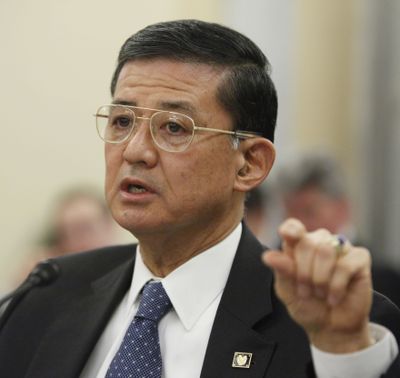Gulf War vets promised new look at illness
VA chief’s vow may affect thousands

WASHINGTON – The Veterans Affairs Department said it will look again at the rejected claims of veterans who say their Gulf War service caused a mysterious illness, the first step toward potentially compensating them nearly two decades after the war ended.
VA Secretary Eric Shinseki said the decision is part of a “fresh, bold look” his department is taking to help veterans who have what’s commonly called “Gulf War illness” and have long felt the government did little to help them.
The VA said it also plans to improve training for medical staff who work with Gulf War veterans, to make sure they do not simply tell veterans that their symptoms are imaginary – as has happened to many over the years.
“I’m hoping they’ll be enthused by the fact that this … challenges all the assumptions that have been there for 20 years,” Shinseki told the Associated Press in an interview.
The changes reflect a significant shift in how the VA may ultimately care for some 700,000 veterans who served in the Gulf War. They also could improve the way the department handles war-related illnesses suffered by future veterans, because Shinseki said he wants standards put in place that don’t leave veterans waiting decades for answers to what ails them.
The decision comes four months after Shinseki opened the door for about 200,000 Vietnam veterans to receive service-related compensation for three illnesses stemming from exposure to the Agent Orange herbicide.
About 175,000 to 210,000 Gulf War veterans have come down with a pattern of symptoms ranging from mild to severe that include rashes, headaches, memory problems, joint and muscle pain, sleep issues and gastrointestinal problems, according to a 2008 congressionally mandated committee that based the estimate on earlier studies.
But what exactly caused the symptoms has long been unanswered. Independent scientists have pointed to pesticide and pyridostigmine bromide pills, given to protect troops from nerve agents, as probable culprits. The 2008 report noted that since 1994, $340 million has been spent on government research into the illness, but little has focused on treatments.
Steve Robertson, legislative director of the American Legion and a Gulf War veteran who has struggled with his own health issues such as joint problems and chronic fatigue, said the decision is welcome news.
“I can assure that there are Gulf War veterans who have been fighting this issue since 1991-92,” Robertson said. “The ones I’ve talked to are very, very upset that they’ve had to fight this battle.”
Shinseki has publicly wondered why there are still so many unanswered questions about Gulf War illness, as stricken veterans’ conditions have only worsened with age.
Last fall, he appointed a task force led by his chief of staff, John Gingrich, a retired Army colonel who commanded a field artillery battalion in the 1991 war, to review benefits and care for Gulf War veterans. The changes stem from the task force’s work.